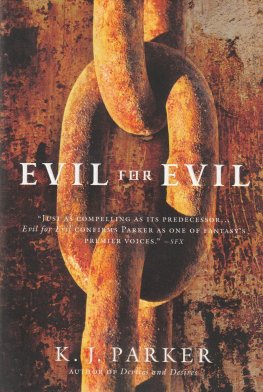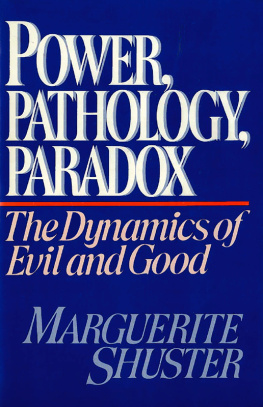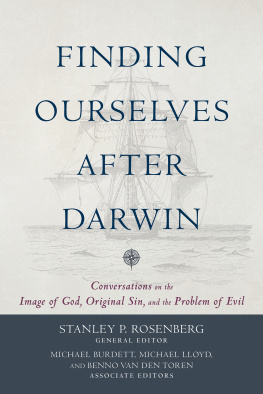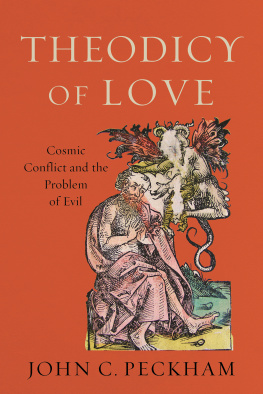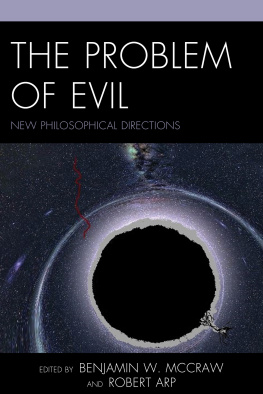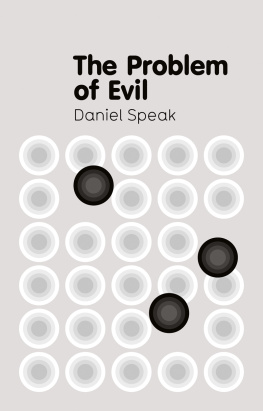Islamic Theology and
the Problem of Evil
Islamic Theology and
the Problem of Evil
Safaruk Chowdhury
The American University in Cairo Press
Cairo New York
This electronic edition published in 2021 by
The American University in Cairo Press
113 Sharia Kasr el Aini, Cairo, Egypt
One Rockefeller Plaza, 10th Floor, New York, NY 10020
www.aucpress.com
Copyright 2021 by Safaruk Chowdhury
All rights reserved. No part of this publication may be reproduced, stored in a retrieval system, or transmitted in any form or by any means, electronic, mechanical, photocopying, recording, or otherwise, without the prior written permission of the publisher.
ISBN 978 1 617 97993 4
eISBN 978 1 649 03055 9
Version 1
Contents
Acknowledgments
T here are a few acknowledgments that must be made. First, I thank Tarek Ghanem, formerly at AUC Press, for initially taking interest in this work and seeing it take off and second, Nadia Naqib and the team thereafter steadily and with incredible patience ensuring it made a sound landing. I really appreciate the warm encouragement given by Kevin Timpe when I contacted him and Ramon Harvey as well as Arnold Y. Mol for reading draft chapters of the book and providing me with very helpful comments. I especially appreciate the meticulous feedback of an anonymous reviewer that has greatly improved the structure, accuracy, contents, and style of the book. I have endeavored to incorporate as much of the reviewers suggestions as I was able to.
Introduction
On June 14, 2017, in the month of Ramadan, around 1:00 a.m. London local time, when many residents were asleep in their homes, but a number of Muslims were either waking up for the predawn meal before the commencement of the next days fast or finishing their late-night prayers, the emergency services received a distress call that a fire had broken out on a twenty-four-story tower block in West London called Grenfell Tower. This fire tore through the exterior cladding of the building in a matter of minutes, and within an hour, despite the heroic efforts of the fire service personnel, the fire had become an uncontrollable blaze claiming the lives of thirty people trapped in the top floors. By early morning, a couple of hours later, the victim tally had doubled and the injury count quadrupled, and the fire in the Tower was now raging fiercely. The night unfolded with destruction and devastation as everything succumbed to the fires blazing reach. It took over a full day to put out the fire and begin the preliminary investigative procedures. Embattled, weary, and traumatized, both the emergency services and Grenfell Tower survivors could not comprehend how and why such a tragedy occurred. This was the deadliest structural fire in the United Kingdom since the 1988 Piper Alpha disaster and the worst recorded residential fire accident since the Second World War. All that remains, other than ethereal memories and traumatized survivors, is a hollow and charred corpse of a building in full view of the regular commuters on the Hammersmith and City line. Even while writing this introduction, two consecutive terrorist attacks took place at mosques in the city of Christchurch, New Zealand, during the Friday prayer on March 15, 2019, killing fifty people and seriously injuring fifty more. The terrorist was a white supremacist ideologue from Australia motivated specifically by a worrying global ascendancy of anti-Muslim
Yet, Muslims (as well as their faith neighbors Jews and Christians) believe with conviction that the world was created by a transcendent and personal CreatorGodwho is absolutely powerful, has knowledge of all things, is fully Merciful, and is perfectly Just and Wise. Muslims also believe that the world and everything in it has been offered as an entrusted gift to us and that it is providentially guided by God for the specific ends and purposes He has determined. Muslims further believe that the evils of pain and suffering can be explicable, and intelligible to our minds and experience, and therefore not a reason to either doubt the existence of God or lack conviction in His specific attributes just mentioned. Are Muslims correct to believe that the world as it is and God so described are compatible? This question gets us to what has been called the problem of evil. This book is an attempt to argue that the existence of evil is at least logically compatible with God as revealed in the Muslim sacred scripture of the Quran. The attempt is carried out bearing in mind that according to some observations, the project of theodicy may not have been a priority within Islamic theological discourse.
In this book, I take theodicy as a worthy project of elaborate consideration. This means first and foremost I consider the problem of evil as a serious theoretical (intellectual) problem, acknowledging as well that there is an experiential (existential) component that has layers of complexity different in its severity and implications as well as a practical (functional) component that involves ways to eliminate what is identified as evil or bring about some desirable goal. Both these components are entirely different (and no less important) than a discursive engagement with theological and philosophical concepts that involve solving a logical problem. The experiential and practical dimensions of the problem of evil require a distinct and separate approachone that I have not made the aim or focus of this bookand so for present purposes, I will not explore them (though I have something to say about this in the conclusion). I have restricted my examination of the problem of evil to four major versions. They are: (1) the problem of why innocents suffer, particularly persons with disabilities, (2) the problem of animal pain and suffering, (3) the evolutionary problem of evil, and (4) the problem of hell. The approach I take in this book is to offer different ways Muslims might respond to these four formulations of the problem of evil using the resources of their own intellectual tradition in order to demonstrate the logical compatibility between the existence of evil and the core attributes of God. The methodology I employ is that of analytic theology where the tools of conceptual precision, argumentative rigor, logical coherence, and systematic reasoning borrowed from the storehouse of analytic philosophy define the style and communication of the content. This method is appropriate for a work that seeks to analyze concepts, claims, and arguments on a range of Islamic theological doctrines. Moreover, as a method, analytic theology has marked similarities with the medieval Muslim scholastic or rational theology called kalam, where definitions, fine distinctions, syllogisms, and dialectics defined the manner in which the discipline was presented and practiced. Before outlining the structure of the present book, let me first situate its significance and relevance within the field of Islamic theodicy.
Key Works on Theodicy
Watt, in an article nearly forty years ago, noted how, compared to Judaism and Christianity, early Sunni Muslims paid little attention to the problem of theodicy, it being a project undertaken exclusively among heretical Muslims by which he was referring primarily to the Mutazilites.third, this current book builds on the merits of these earlier works and explores avenues not directly addressed by them.
One of the first works to thoroughly examine theodicy is Ormsbys Theodicy in Islamic Thought where he undertakes a rigorous analysis of Arabic theological sources related to the controversy surrounding al-Ghazalis statement that the actual world is the best possible one. Ormsby unpacks the central claims underpinning its controversy and the constellation of secondary problems arising from it, setting out the core scholastic arguments and counterarguments. Particularly helpful is the analysis and presentation of the significance of Gods omnipotence, divine wisdom and benevolence, and the metaphysical notions of possibility and necessity, and how ideas about them impacted and shaped the theological debate over a number of centuries subsequent to al-Ghazali. The book is filled with rich analysis and translations, making it indispensable as a reference for understanding the various reactions and embedded discussions and how Muslim scholars grappled with the perennial issues confronting any articulation of theodicies or indeed a doctrine of optimism from the dictum of one man. Ormsbys approach, although not analytic theology, is no doubt one of the earliest to give a systematic and methodical exposition of a theme very much different from the then prevailing method of historical analysis within Islamic Studies.


